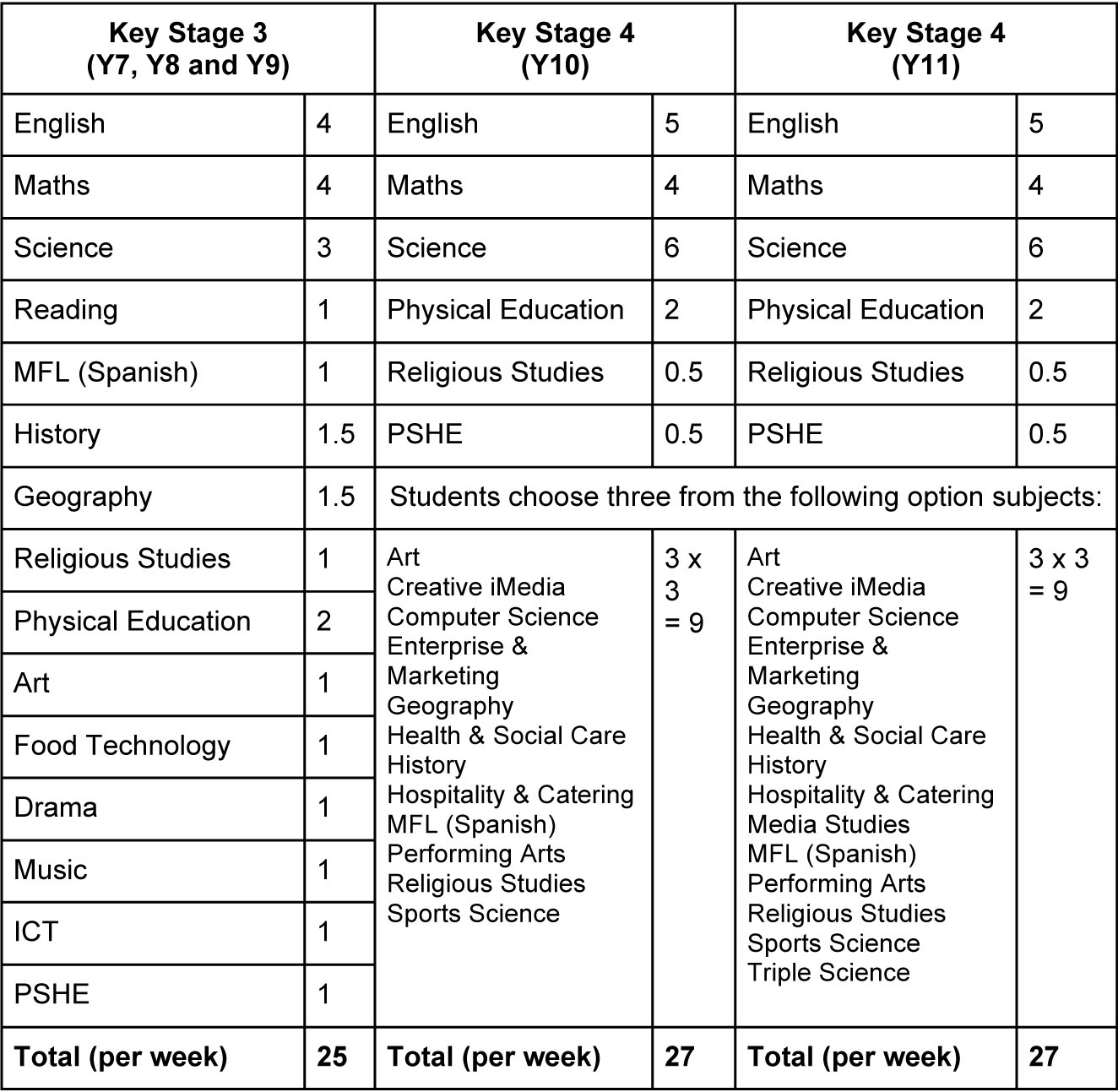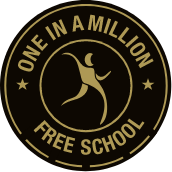Curriculum & Subjects
As an inclusive secondary school, we aim to ensure that each individual student unlocks their potential and achieves their academic targets or exceeds them. Our curriculum is a key lever in achieving this mission. The curriculum is designed to give all of our students the knowledge, understanding and skills they need to succeed in the opportunities, responsibilities and experiences they will face in later life. We believe that every student is unique and valued. We aim to develop a deep sense of self-worth and ambition in all our students, in line with our core values of compassion, honesty, integrity and excellence.
The school adopts a holistic approach to the curriculum and in line with the Trust’s vision has a connected curriculum following three themes: Sport, the Arts, Enterprise.
Our curriculum has been designed to be broad and balanced, taking into account students’ starting points and end goals. Our curriculum follows a three-year Key Stage 3 National Curriculum experience and a two-year Key Stage 4. This provides students with a sound grounding as well as providing time to develop in preparation for rigorous GCSE examinations. We believe this curriculum design builds resilience and broadens experience. At key stage 4, students specialise through the options process. All students follow the core curriculum comprising English, Maths, Science, PE, Religious Studies and PSHCE. Students can choose from three pathways; an academic pathway, including the Ebacc subjects, a vocational pathway, including the option to study Health and Social Care, Business and Enterprise, Hospitality & Catering, Performing Arts and Sports Science for example, and a bespoke pathway, designed to support students with significant barriers to learning. Guidance around which pathway to choose is based upon each student’s prior attainment at Key Stage 2, progress to date and next steps plans and ambitions.
Outcomes and Progression (CLICK HERE):
Our curriculum supports progression to post-16 education, apprenticeships and/or employment with training. This is in line with our school motto of: Enjoying today, preparing for tomorrow. Our curriculum also supports students who aspire to higher education, by providing a solid foundation of learning and progress at Key Stage 3 and 4, supporting their ambition and enabling them to access their next steps.
Our careers programme links with local and national businesses and students meet with a range of employers through our “Words for Work” programme and events such as Bradford Manufacturing Week and our Careers Fair. Our Careers Coordinator advises on careers provision across each key stage, in line with the Gatsby benchmarks. We continue to forge closer links with local post 16 providers and the Local Enterprise Partnership to ensure our students receive the best advice and guidance possible.
Our extra-curricular provision is designed to enrich students’ experience. This is in line with our holistic learning experience, which seeks to support the development of soft skills such as character, communication skills, team working, resilience and independence. We are continually developing our student leadership programme, seeking to develop confidence and other life skills.
- This programme includes: Head Girl and Head Boy; Prefects; Representatives on the Student Council; House Captains and Vice Captains; Values Champions; Mental Health Ambassadors and Anti-bullying Ambassadors. We value our student voice and the role they play as stakeholders within the school.
The school also continues to develop the Connected Curriculum in line with the Trust’s vision following three themes: Sport, the Arts, and Enterprise. This curriculum enables students to: attain additional knowledge, understanding and skills; adds to students’ cultural and social capital and further prepares them for their next steps.
Ambitious and Accessible (CLICK HERE):
Our curriculum is ambitious and accessible to all students regardless of their background, starting point, special educational need or disability (SEND). It is designed to be inclusive and provide a broad, rich, and deep learning experience for all of our students. It is flexible enough to be tailored to the needs of specific students who need additional support.
The curriculum promotes equality of opportunity and challenges discrimination with particular regard to the protected characteristics as outlined by the Equalities Act 2010. The ‘protected characteristics’ are: age (which is not applicable with regard to our students), disability, gender reassignment, marriage and civil partnership, pregnancy and maternity, race, religion/belief, sex and sexual orientation.
Many children and young people who have special educational needs may also have a disability. The Equality Act 2010 defines disability as ‘… a physical or mental impairment which has a long term and substantial adverse effect on their ability to carry out normal day-to-day activities’. This means that, where a child or young person has a disability, the way in which their needs are met will depend on the impact the disability has on their access to education. At One In A Million Free School, we are committed to supporting and developing our teachers so that they continue to develop their skills to make adaptations and reasonable adjustments to support students with SEND.
Curriculum Design (CLICK HERE):
Curriculum mapping by Heads of Department, Heads of Faculty and Subject Leads creates schemes of learning which build and sequence knowledge, understanding and skills across each key stage. Careful planning provides meaningful opportunities for the development and mastery of core skills and key knowledge so that students are able to access the curriculum fully and successfully. Data Informed Practice is a key element of Teaching and Learning at One In A Million Free School. The learning and progress of our students across our curriculum is evaluated using formative and summative assessment. Marking and feedback is targeted and focused on celebrating learning and progress, whilst highlighting areas for improvement which are addressed through our STEP Marking (S = Summary of the work produced, T = Task to complete to secure further improvement, E = Engagement with this task from students and P = Progress acknowledged by teachers).
Impact data including, attainment and progress data, Learning Walk analysis, Work Scrutiny information and Student Voice, is collated, analysed and evaluated by the Senior Leadership Team and Curriculum Leaders to measure the success of curriculum intent and implementation, informing curriculum change and development over time.
Curriculum Mapping (CLICK HERE):
Curriculum Road Maps and Curriculum Overviews are published on the school’s website, detailing what students are learning each term in each year group. The Curriculum Overview provides detail of what is being taught and learnt in lessons and how the knowledge, understanding and skills will be assessed. The Curriculum Road Maps provide a more visual approach that details the sequential learning journey across a year for each subject for our students.
Each student will be given a Knowledge Organiser for every unit/topic they study in each subject. The Knowledge Organiser summarises the key information for each unit/topic and is a useful revision resource. Each student will also receive a Progress Ladder for every unit/topic they study in most subjects. The Progress Ladder allows the teacher to highlight what each student’s strengths are (in other words, what they know and can remember) and what their areas for development are (or, what they don’t know or can’t remember…yet). Both of these documents will be glued into exercise books or found in student portfolios.
Curriculum Map Key Stages 3 and 4 (CLICK HERE):

What Parents/Carers can do to help (CLICK HERE):
The above documents are designed to support communicate with parents/carers. They provide information about what their child will be learning and studying. We encourage parents/carers to have meaningful conversations at home about what is being learnt at school and how students can progress.
Parents/carers are asked to support their child with their homework (as detailed in the Home School Agreement, found in the student planner), be it either online homework (Sparx Maths) or written homework. Students can also access GCSE POD, Seneca and BBC Bitesize etc. for revision purposes. In KS4 options, students will be given or have the opportunity to purchase a revision guide.
To find out more details about the schools curriculum contact us on 01274 723439 or email us at school@oneinamillion.org.uk
